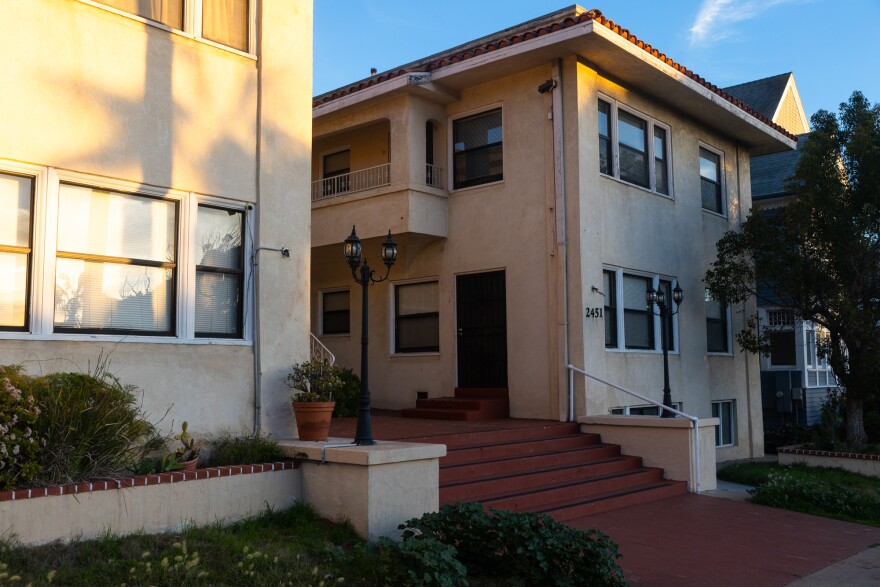This year, three public housing agencies in San Diego County committed to policy changes that grant nearly 30,000 low-income families the same protection from excessive rent increases guaranteed to other California tenants.
That means — for the first time — half a billion dollars in federal housing vouchers will have an additional layer of oversight, saving untold millions and stretching limited funding even further.
And new records from the San Diego Housing Commission, the region’s largest public housing agency serving 17,000 city households, offer a peek into the process and potential impact of ensuring rent increases for low-income tenants comply with state law. Dozens of requests to raise the rent have been denied this year.
These changes followed an award-winning inewsource investigation that ultimately revealed half of the county’s six public housing agencies, which are responsible for managing the federal Section 8 Housing Choice Voucher program, were approving rent increases for low-income tenants without checking whether they exceeded the cap set by state law.
Since then, attorneys and advocates have already noticed a difference with these agencies — in the city and county of San Diego, as well as Oceanside.
“We have seen (the agencies) deny illegal contract rent increases and send out a letter to the landlord and Section 8 tenant explaining why the request was denied,” said Gil Vera, deputy director of Legal Aid Society of San Diego, the largest poverty law firm in San Diego County.
“As a result, Section 8 tenants aren’t put in the position where they have to raise the illegal rent increase issue to the landlord, which can sometimes create tension between a landlord and tenant,” Vera said.
Passed in 2019, the California Tenant Protection Act limits how much property owners and managers can raise the rent in a 12-month period. It set a 10% maximum cap, or 5% plus the percentage change in the cost of living, whichever is lower. Every year, that calculation is determined in April and the change takes effect August 1.

Conflicting interpretations
When the California Tenant Protection Act took effect in 2020, it set off a yearslong legal debate about whether those state protections extend to federal voucher holders. Ultimately, the state Attorney General and the federal agency overseeing the Section 8 program both said housing agencies have a duty to ensure rent increases comply with state law.
In San Diego County, the most a landlord can increase the rent is 8.6% — that cap will remain in effect until the next adjustment in August 2025.
There are some exemptions, including certain single-family homes and condos, but the cap applies to most rental properties in California older than 15 years.
When landlords want to raise the rent on tenants with a Section 8 voucher, the agency issuing that voucher must first ensure the increase is reasonable and lawful before using taxpayer money to cover it.
A nine-page “process sheet” recently obtained by inewsource outlines a new step-by-step procedure for Housing Commission staff to review rent increases for both exempt and nonexempt properties in the city of San Diego. It took effect in March, soon after the federal agency overseeing the Section 8 program issued guidance saying housing authorities have a duty to ensure rent hikes are lawful.
To aid in the review process, Housing Commission staff is using two rent cap calculators. One compares the requested amount to the capped amount, to ensure rent increases don’t exceed caps in the law. And the other helps staff track multiple requests within the same year.
When a request exceeds the cap, staff are instructed to send a letter to the tenant and housing provider explaining the denial.
In addition, the Housing Commission checks to ensure tenants living in exempt properties receive proper notice. Property owners and managers are required to provide 90-day notice when a rent increase exceeds 10%.
If a tenant doesn’t receive proper notice, staff are instructed to postpone the effective date of the rent increase to allow for 90 days.
In a six-month period following these changes, data shows Housing Commission staff rejected an increase 41 times because the request “exceeds maximum rent.” That includes requests that either violated state law, or were within the cap but deemed unreasonable for the area.
The San Diego County Housing Authority, which helps nearly 11,000 families pay rent through the federal safety net program, did not provide a copy of its new policy or procedure. However, a spokesperson said officials have “updated processes and internal tools and resources for staff to ensure rent increases are compliant” with state law.
The county has also posted guidelines for property owners seeking rent increases, informing them that requests will be tracked for compliance. County officials said they don’t collect data on requests denied for failing to follow the state rent cap.
Officials with the Oceanside Housing Authority, which serves nearly 1,300 households, said back in September they were “targeting an Oct. 1 start date where we institute a new process that will include a landlord certification whenever a rent increase is requested.
“In addition, we will review rent increases to ensure that the increase is allowable under the Tenant Protection Act,” said Ray Rull, Oceanside’s program manager. “Part of the roll-out is landlord education to not only explain the new rent increase policy but also provide information on recently enacted CA laws affecting both landlords and tenants.”
Officials have not yet responded to questions about whether Oceanside’s roll-out has unfolded according to plan.







